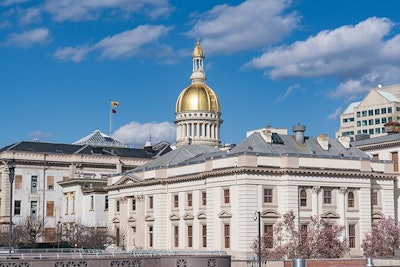
New Jersey’s legislators advanced an adult-use cannabis legalization bill Nov. 26 in a joint Senate and Assembly Budget Committee vote of 7-3 and 7-2, respectively.
The vote came after four hours of public testimony and debate. The committees were scheduled to take up a separate medical cannabis expansion bill and cannabis conviction expungement legislation. Collectively, the bills comprise a trio of cannabis reform measures that have been talked about in various forms since Gov. Phil Murphy took office in January (though sponsor Sen. Nick Scutari has been leading the legalization conversation in Trenton for more than a decade). After running up against the clock, the committee halted testimony and took a vote only on the adult-use bill.
The approved and amended version of that bill would set a 12-percent retail tax and an optional local 2-percent tax on cannabis sales. Notably, the legislation would set up a licensing process that does not mandate vertical integration; five license types would be available, including growers, product manufacturers, wholesalers, testing facilities, and retailers. (The state’s medical cannabis market currently includes only vertically integrated businesses.)
Home cultivation is not a part of this legislation. Rather, adults 21 and older would be allowed to purchase and possess one ounce of flower; up to 72 ounces of liquid marijuana-infused products, like beverages; up to 16 ounces of solid marijuana infused-products, like edibles; and seven grams of marijuana extracts, like cannabis oil.
The bill will now go to the full Senate and Assembly floors for separate votes, which could happen as soon as next month. Murphy has vocally supported cannabis legalization, but he has yet to openly endorse this particular bill. ("Governor Murphy remains committed to legalizing adult-use marijuana, a critical step in eliminating racial disparities in our criminal justice system,” according to a statement published by his office on Thanksgiving.)
And, indeed, much of the debate on Monday swirled around how legalization would impact local populations affected disproportionately by law enforcement under prohibition. As NJ.com’s Payton Guion has reported, New Jersey has historically arrested more people for cannabis possession “than nearly any other state, but for minorities, that risk is even greater.”
State Sen. Ronald Rice argued that the legalization bill, as written, would continue the economic and social disparity between white and black residents of the state. The economic impact, he said, could end up excluding black residents who were hurt most by prohibition policies. Only six companies have been licensed so far in New Jersey’s nascent medical marijuana market, and six more vertically integrated licenses are expected to be issued soon.
“Whether you’re for or against this bill, this bill requires a racial impact statement,” Rice said. (Former Gov. Christ Christie enacted that law during his final days in office, mandating an analysis for future bills that would alter “pretrial detention, sentencing and parole,” according to the Wall Street Journal.) Such an analysis has not yet been presented on this bill.
Assemblyman Jamel Holley, who cast a “yes” vote for the bill, also lent his voice to the calls for clarity on the question of racial and social inequality in cannabis reform. He pressed John Zebrowski, police chief in Sayreville, on the history of law enforcement and cannabis prohibition. “Until we provide some relief, this [trend of arrests] is going to continue,” he said. “This keeps you in business.”
Zebrowski joined other law enforcement officials in testifying against the bill, saying only that the state should look into “decriminalization” instead.
“Painfully absent in your testimony is any mention of a solution,” Assemblyman Joe Danielsen countered.
State Sen. Sam Thompson put it most starkly in his summary comment: “I feel the negatives of legalization outweigh the positives. I’m a no.”
Ultimately, though, the yeas had it.
The Marijuana Policy Project issued a statement on the tone of the hearing, which teed up another round of debate when the expanded medical cannabis bill and the cannabis conviction expungement bill land in the committees’ laps.
“New Jersey is one step closer to replacing marijuana prohibition with sensible regulation,” general counsel Kate Bell said. “Arresting adult cannabis consumers is a massive waste of law enforcement officials’ time and resources, and it does nothing to improve public health or safety. … We are encouraged by the ongoing discussion about how best to address the history of racially disparate enforcement of marijuana laws. By streamlining the expungement process, the state can help ensure people with criminal records for marijuana-related offenses get a clean slate. Nobody should be branded a criminal simply for using a substance that is less harmful than alcohol.”
Sen. Paul Sarlo, who chaired the meeting, said that the cannabis legalization debate brought in “probably the largest budget committee hearing ever convened.” He added that he was a “no” vote before the hearing began—but he decided to abstain from casting a vote, in order to “allow the debate to go forward.”
“I just don’t believe we are there yet in New Jersey to legalize marijuana,” he said. “As a parent, as a coach, it’s something I wrestle with.”
Sen. Sandra Cunningham, calling the bill a “criminal justice opportunity and an economic development opportunity,” said that the testimony offered during the day-long hearing flipped her from a “no” to a “yes” vote. She painted a picture of the poorer families of New Jersey, with children stuck in economic ruts inflamed in part by drug arrests and cannabis prohibition. She said she wanted to find a solution.
“I don’t know if this is the bill to do it—to generate hope and get things moving,” she said, “but it is a start.”
Top photo courtesy of pabrady63/Adobe Stock


























